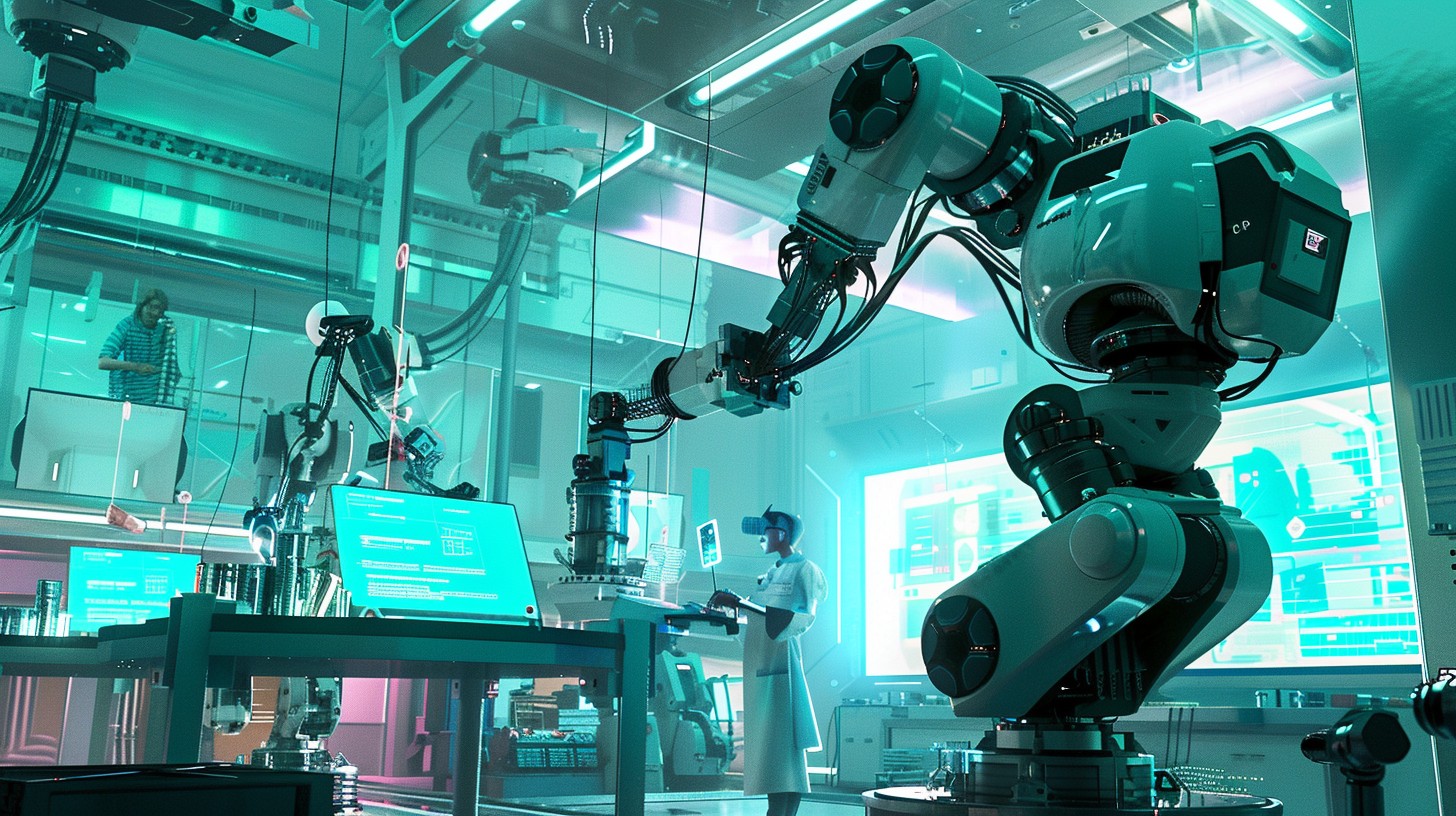AI Revolution How Artificial Intelligence Will Dominate the Future. The AI revolution is transforming industries, reshaping societies, and fundamentally altering the way we live, work, and interact with technology. Artificial intelligence (AI) is not just a buzzword—it’s a powerful technology that will continue to evolve and dominate the future. As businesses, governments, and individuals leverage AI to solve complex problems and enhance efficiency, this revolution will bring about unprecedented changes in every sector. From healthcare to finance, manufacturing to education, AI is poised to become the defining technology of the 21st century.
What is Artificial Intelligence?
Artificial intelligence refers to the simulation of human intelligence in machines that are programmed to think, learn, and problem-solve like humans. Artificial Intelligence Will Dominate the Future.These systems use algorithms, data, and computational power to perform tasks that typically require human cognition, such as visual perception, speech recognition, decision-making, and language translation. The key features of AI include:
- Machine Learning (ML): A subset of AI that enables systems to learn from data and improve over time without being explicitly programmed.
- Natural Language Processing (NLP): The ability of machines to understand, interpret, and generate human language.
- Neural Networks: Algorithms modeled after the human brain, used to recognize patterns and process large amounts of data.
- Automation: The use of AI to perform repetitive tasks more efficiently than humans can.
The Role of AI in Modern Society
AI is already embedded in our daily lives. From voice assistants like Siri and Alexa to recommendation algorithms on platforms like Netflix and YouTube, artificial intelligence enhances user experiences by learning from preferences and behavior. However, AI’s true potential extends far beyond these conveniences. It is rapidly being integrated into critical sectors that drive the global economy.
AI in Healthcare: Transforming Patient Care
One of the most promising areas for AI is healthcare. Machine learning algorithms can analyze vast amounts of medical data to detect diseases early, identify patterns in patient histories, and suggest personalized treatment plans. The implications for patient care are profound:
- Early Disease Detection: AI systems can scan medical images, such as X-rays and MRIs, to detect diseases like cancer at an early stage, sometimes more accurately than human doctors.
- Precision Medicine: AI helps tailor treatments based on a patient’s genetic makeup, leading to more effective and personalized care.
- Virtual Health Assistants: AI-powered health apps monitor patients’ symptoms, track medication, and offer real-time advice, reducing the need for frequent doctor visits.
- Drug Discovery: AI is accelerating the development of new drugs by simulating thousands of chemical combinations and identifying promising candidates for treatment faster than traditional methods.
AI in Business: Driving Efficiency and Innovation
In the business world, AI is a game-changer. Companies are using AI to optimize operations, improve decision-making, and enhance customer experiences. Some of the key applications include:
- Data Analytics and Insights: AI can sift through large datasets to identify trends, make predictions, and provide insights that inform better business decisions.
- Customer Service Automation: Chatbots and virtual assistants are increasingly being used to handle customer inquiries, reducing the need for human intervention and improving response times.
- Predictive Analytics: AI helps businesses predict consumer behavior, optimize inventory, and forecast demand, leading to better financial planning and resource allocation.
- Personalized Marketing: AI can analyze customer data to create highly personalized marketing campaigns that increase engagement and conversion rates.
AI in Finance: Shaping the Future of Banking
The financial sector is undergoing a massive transformation thanks to AI. Banks and financial institutions are integrating AI to streamline operations, enhance security, and provide better services. Key advancements include:
- Fraud Detection: AI systems analyze transaction patterns in real-time to detect anomalies and flag suspicious activity, reducing fraud risks.
- Algorithmic Trading: AI-driven algorithms can execute high-speed trades based on real-time market data, maximizing profits and reducing human error.
- Robo-Advisors: AI-powered financial advisors offer personalized investment advice, manage portfolios, and help individuals make smarter financial decisions.
- Credit Scoring: AI models can assess a person’s creditworthiness by analyzing a wider range of data points, allowing for more accurate and fair credit assessments.
AI in Manufacturing: Revolutionizing Production
AI is revolutionizing the manufacturing industry by making production processes smarter, faster, and more efficient. From predictive maintenance to quality control, AI is playing a critical role in reducing costs and improving production quality.
- Predictive Maintenance: AI algorithms monitor equipment in real-time, predicting failures before they happen and scheduling maintenance, reducing downtime and repair costs.
- Robotics and Automation: AI-powered robots are taking over repetitive and dangerous tasks on factory floors, allowing human workers to focus on more complex tasks.
- Supply Chain Optimization: AI helps optimize supply chains by predicting demand, managing inventory, and reducing transportation costs, ensuring that goods are delivered efficiently.
AI in Education: Personalized Learning Experiences
AI is also transforming education by offering personalized learning experiences that adapt to the individual needs of students. With AI, educators can create tailored learning paths that suit the abilities and learning styles of each student.
- Adaptive Learning: AI-driven platforms adjust the pace and difficulty of lessons based on a student’s progress, ensuring they receive the right level of challenge.
- Automated Grading: AI can assist teachers by automatically grading assignments and providing instant feedback to students, allowing for more efficient evaluation processes.
- Virtual Tutors: AI-powered tutoring systems can help students with specific subjects or challenges, providing personalized assistance outside the classroom.
- Language Translation: AI-powered tools allow students to access educational materials in their native language, breaking down language barriers in global education.
Challenges and Ethical Considerations in AI Development
While AI has the potential to revolutionize numerous industries, it also presents significant challenges and ethical concerns. As AI continues to evolve, it raises questions about privacy, security, and fairness.
- Job Displacement: One of the most significant concerns is the potential for AI to automate jobs, leading to widespread job displacement. While AI will create new roles, there is a growing need for reskilling the workforce to adapt to this shift.
- Bias in AI Algorithms: AI systems are only as good as the data they are trained on. If the data contains biases, the AI model will likely perpetuate those biases, leading to unfair outcomes, particularly in areas like hiring or criminal justice.
- Data Privacy: The widespread use of AI systems raises concerns about the security and privacy of personal data. Strong regulations and policies are needed to ensure that AI systems do not violate individuals’ privacy rights.
- Autonomous Systems: As AI progresses toward autonomous vehicles and other autonomous systems, questions about liability and safety will become critical. Determining who is responsible for an AI-driven decision—whether it’s the developer, the user, or the AI itself—poses ethical challenges.
The Future of AI: What’s Next?
The future of AI is filled with incredible possibilities. As AI technologies become more sophisticated, they will continue to push the boundaries of what is possible in every sector. Some future trends in AI include:
- AI and Quantum Computing: The integration of AI with quantum computing could exponentially increase the computational power available for solving complex problems, such as climate modeling or drug discovery.
- General AI: While current AI is narrow AI, designed to perform specific tasks, the development of artificial general intelligence (AGI)—AI with the ability to understand, learn, and apply intelligence across a wide range of tasks—could revolutionize everything from creativity to scientific research.
- AI in Climate Change: AI will play a critical role in addressing global challenges like climate change by analyzing data, predicting environmental trends, and suggesting solutions for more sustainable practices.
- AI Ethics and Governance: As AI becomes more integrated into society, governments and organizations will need to develop strong ethical frameworks and regulatory policies to ensure the responsible development and use of AI.
Conclusion: AI Will Dominate the Future
The AI revolution is already underway, and its impact will only grow in the coming years. From healthcare and finance to education and manufacturing, AI will continue to reshape industries, create new opportunities, and challenge traditional ways of working. However, with great power comes great responsibility. As AI becomes more prevalent, addressing the ethical and societal challenges it presents will be crucial to ensuring that this technology benefits everyone.



